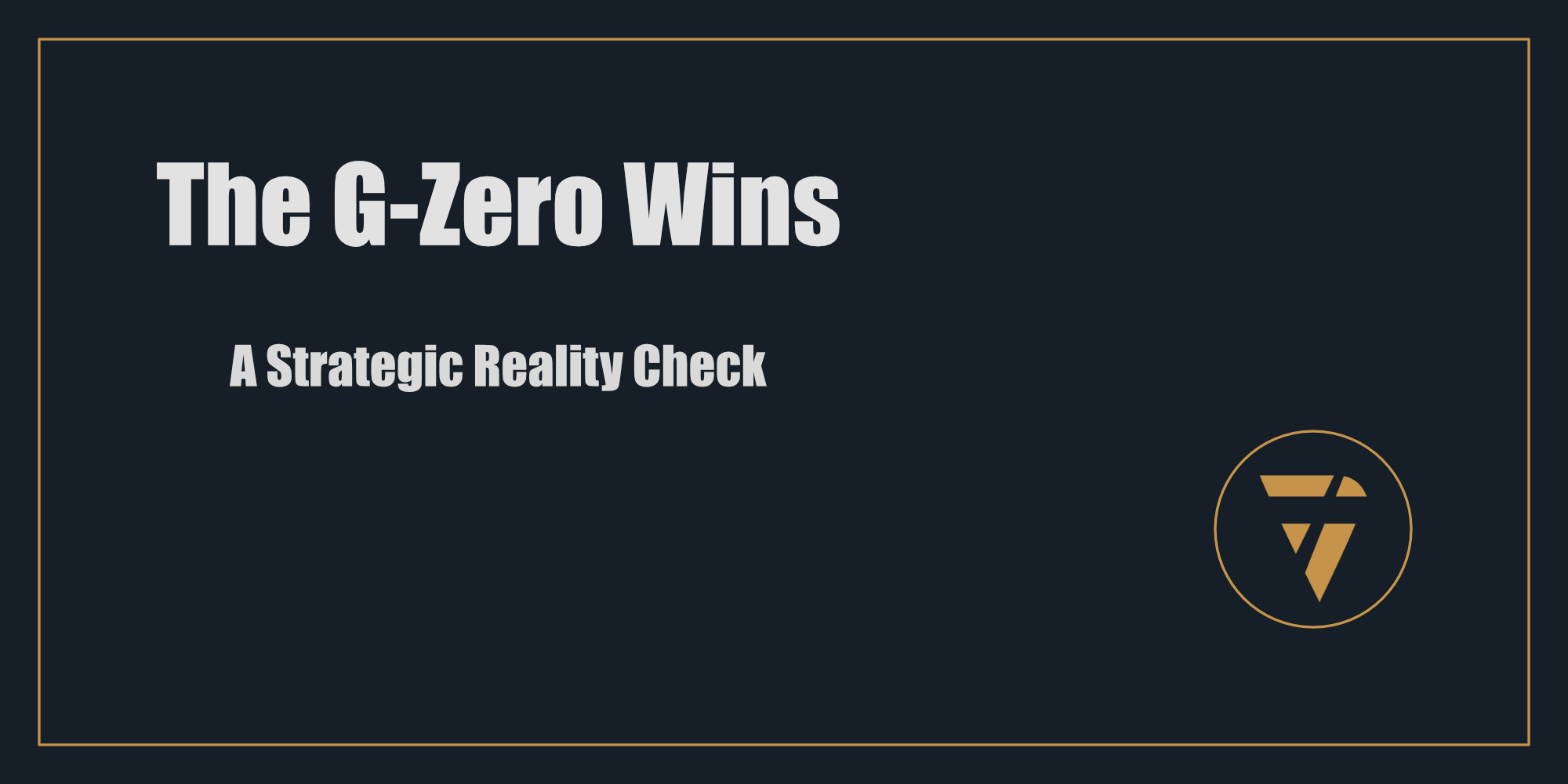The G-Zero Wins
A Strategic Reality Check

What if the collapse of global leadership isn’t a temporary stumble, but the new normal? The "G-Zero" isn’t just a geopolitical term, it’s the operating system of chaos, and it’s here to stay.
Why the G-Zero Matters Now
In the past, the world order rested on the illusion of stability: the United States as a reluctant sheriff, global institutions as architects of progress, and the rest of the world dutifully playing along. The "G-Zero" era, as outlined in the Eurasia Group's 2025 Risks, describes a world with no dominant power willing or able to lead. It’s a system with holes too vast for traditional institutions to patch, fostering an environment where instability is the default.
The implications for business, governance, and society are profound. This isn’t just about broken systems, it’s about recalibrating to survive in a world where no one is steering the ship. The stakes couldn’t be higher.
The Myth of Decline-as-Recovery
Optimism for 2025 assumes that geopolitical tensions are receding. But look closer: Ukraine’s conflict isn’t approaching a diplomatic resolution, it’s hurtling toward a test of endurance that only a decisive victory will halt. In the Middle East, Israel’s actions point to escalation, not de-escalation. The United States, bruised by internal fractures, faces an existential crisis masquerading as stability.
The G-Zero wins because it thrives on half-measures and platitudes. What’s being framed as stabilization is, in reality, exhaustion, a dangerous substitute for resolution. Stability in a G-Zero world isn’t a restoration; it’s stagnation under duress.
Why Institutions Are Failing
At the core of the G-Zero is the collapse of global systems that once held sway. Institutions like the United Nations and World Bank are outdated, reflecting power dynamics from the 20th century. Russia, an aging rogue state, and China, a disillusioned stakeholder, have exploited these cracks to carve out destabilizing roles. The US is simply disintegrating.
But institutions are not failing simply because they’re old; they’re failing because they were never designed for this world. Addressing climate change, AI governance, and transnational security requires unprecedented co-operation, but the systems we rely on are neither structured nor incentivized to deliver it. Inertia and internal dysfunction have rendered them impotent.
The New Power Vacuum
With no hegemon to impose order, the "law of the jungle" becomes policy. The G-Zero empowers actors like North Korea, Iran, and corporate giants who exploit the absence of oversight. These players thrive in chaos, reshaping norms for their benefit while eroding trust and stability.
For business, this translates into operational unpredictability, from fluctuating regulations to disrupted supply chains. For governments, it’s a relentless drain on resources spent managing crises instead of preventing them.
Navigating the G-Zero Reality
- Adaptability is Non-Negotiable: Companies must embrace decentralized decision-making to thrive in fragmented markets. Leaders should empower regional teams to navigate local nuances in real-time.
- Partnerships Over Institutions: Global challenges require alliances built on agility, not bureaucracy. Whether in climate tech or trade, prioritize private-sector innovation and regional coalitions over legacy systems.
- Scenario Planning as Strategy: Businesses must shift from static forecasts to dynamic scenario models, preparing for disruptions across geopolitical, technological, and economic domains.
- Leadership Reimagined: The absence of a global sheriff demands that businesses step up. Corporate responsibility isn’t just ethical, it’s pragmatic. Sustainable practices and community investment will be survival strategies, not add-ons.
The G-Zero Isn’t a Crisis—It’s a Catalyst
The G-Zero doesn’t signal the end of order, but the birth of a new one. The question isn’t whether the system will evolve, it’s whether you’ll evolve with it. For leaders, this is a moment to abandon outdated paradigms and embrace pragmatic, ground-up strategies that thrive in uncertainty.
What are you doing to future-proof your organization in a G-Zero world? Let’s talk about how strategic mindfulness and actionable insights can position you not just to survive, but to lead.
This Substack is reader-supported. To receive new posts and support my work, consider becoming a free or paid subscriber.
This is what I’m working on. Tell me what you think, I enjoy the conversation! Subscribe and follow the work in real time.
Thanks!
B
In the G-Zero world, no one’s in charge. Institutions fail, leaders abdicate, and chaos thrives. Stability won’t return, it’s time to adapt. Decentralize, plan for disruption, and build agile alliances. Survival favours the prepared.
PS -





